I’ve set out to uncover the truth around low calorie natural sweeteners like Stevia, Monk Fruit & Yacon Syrup to find out whether they’re any different from non-natural artificial sweeteners.
If you’ve been reading the news lately, you may have seen the new developments in the area of artificial sweeteners. A recent 2017 systematic review has found that artificial sweeteners like Splenda and aspartame may cause weight gain and other serious health problems. Check out my post on artificial sweeteners and weight gain here where I explore some of these claims. Hearing this news may have triggered a variety of reactions. The first one might be: “I don’t believe it and until they ban them, I’m still using em.” Or maybe your reaction was: “What the F, #ByeFelicia!”. Or maybe your reaction looked like this: “it’s all good, I use low calorie NATURAL sweeteners, like Stevia so I’m in the clear.”
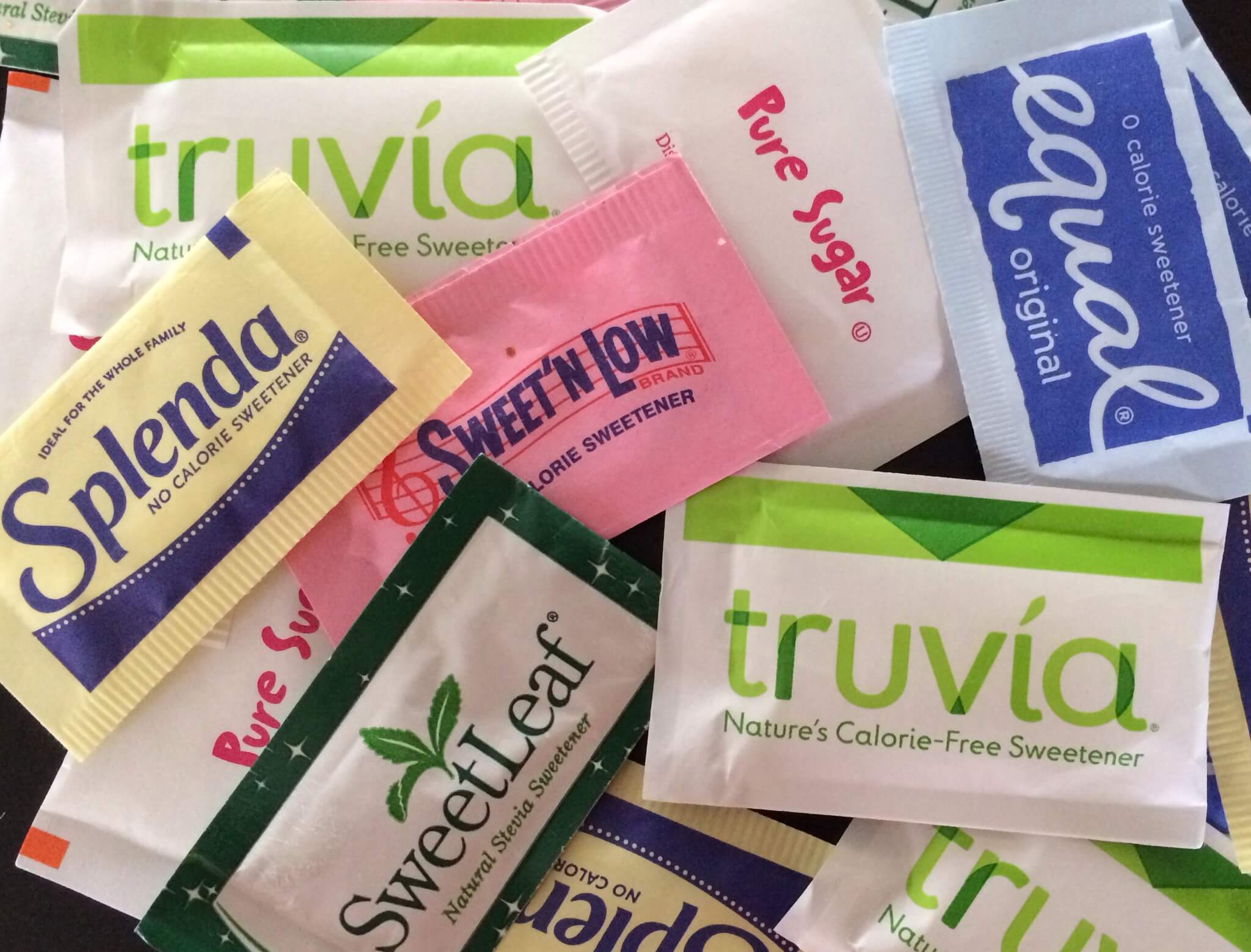
All of these reactions are totally valid, but for a while now I’ve questioned the super powers of Stevia and whether low calorie natural sweeteners are the way to go are really any different than the artificial stuff. To answer these questions, I’ve set out to uncover whether natural low calorie sweeteners, like Stevia, carry any of the potential dangers that artificial sweeteners have and whether natural necessarily equates to healthy.
What are Artificial Sweeteners?

Artificial sweeteners are VERY low calorie sweeteners and have a higher intensity of sweetness per gram compared to common caloric sweeteners. You can find these sweeteners in diet soft drinks, yoghurts, desserts and gum. You can also purchase sweetener all on its lonesome to add to baking and beverages. As you can see from this handy dandy infographic here, Stevia extract is considered part of the artificial sweetener family, however the only difference is that it is extracted from nature and not synthetically made in a laboratory.
Artificial Sweeteners vs. Low Calorie Natural Sweeteners
Low Calorie Natural Sweetener 1: Stevia
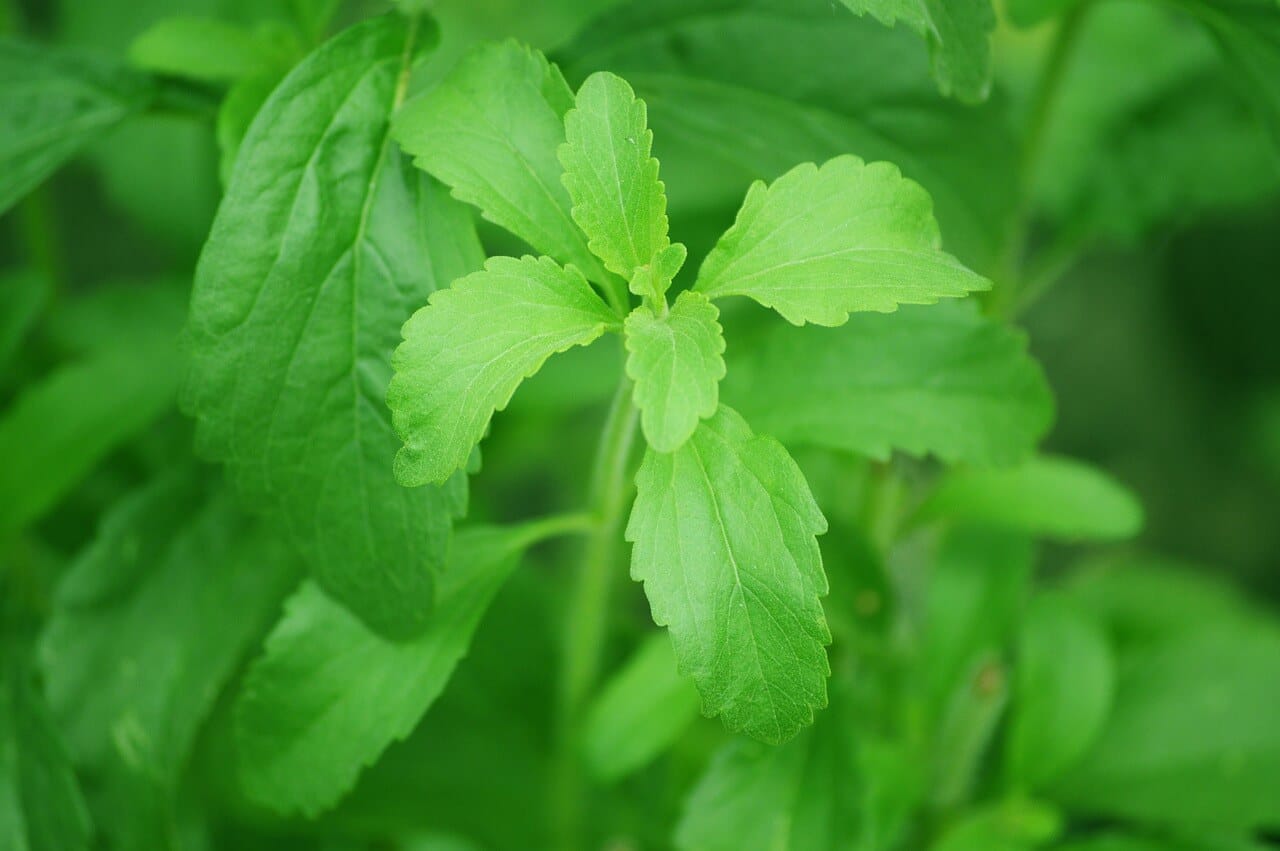
The hottest newest addition to the artificial sweetener list is Stevia. Stevia comes from the leaves of the stevia plant native to South America. You can buy Stevia in liquid or powder form. Stevia is used for medicinal purposes and indigenous groups use stevia leaves to sweeten herbal teas.
There are two forms of stevia that you should know about. Health Canada regulates purified stevia extract and is safe. Health Canada does not regulate Unrefined stevia extracts, leaves and powders. The unrefined version is a Natural Health Product (NHP). We don’t know much about this unrefined type of Stevia and its safety. In the United States Stevia is not needed to be approved by the FDA because it’s considered safe for use in food.
Since governments have deemed purified stevia extract safe, I want to know a few things. Does it carry any health benefits? Could it cause weight gain and other health problems like other artificial sweeteners?
First of all, in the 2017 systematic review stevia was one of the sweeteners examined, which means chronic consumption of stevia may lead to possible weight gain. Having said that, there is some research that shows that stevia may lower blood pressure. In a double-blind placebo-controlled trial, when oral stevia was given to 106 Chinese hypertensive subjections. After 3 months, their systolic and diastolic blood pressure decreased significantly compared to the control group. This was also shown in a study with rats, here and here.
A more recent 2010 systematic review found that two long term studies demonstrated that stevia may be effective at lowering blood pressure in hypertensive patients. However the results from shorter studies did not support those findings. That 2010 review was the most recent evidence I could find on the subject. Researchers concluded that a long-term investigation is necessary to make a more convincing claim that stevia carries any superior health benefits.
LOW CAL Natural Sweetener 2: Monk Fruit (Lakanto)
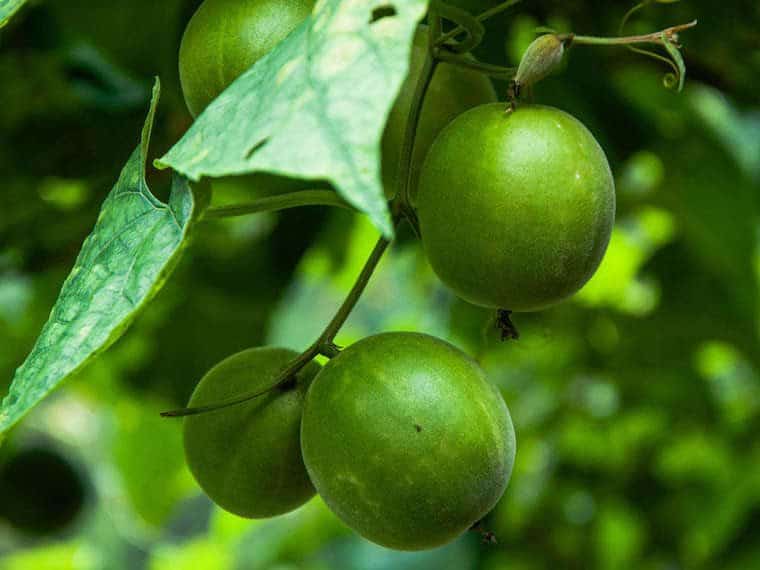
Photo: Carl99 / Getty
Is monk fruit safe?
Another natural sweetener is monk fruit, known by its commercial name: Lakanto. Monk fruit resembles a green melon and was first used by Buddhist monks. The fruit’s extract is used as a sweetener and is considered by the FDA as generally safe. The antioxidant, mogroside makes Monk fruit syrup sweet. As of yet, no studies have looked at monk fruit and its effect on weight specifically. I did find one recent 2017 study that compared aspartame, monk fruit, stevia and sucrose on energy intake.
In the randomized study, 30 healthy male subjects were allocated to four treatment groups (aspartame, stevia, monk fruit, sucrose). The study found that those who had any of the artificial or low calorie natural sweeteners ate more than those who ate the regular sugar drink. It seems that any energy they “saved” with the artificial sweeteners was fully compensated at the meal to yield no difference in daily energy intake between the treatment groups. The glucose response also did not differ between all groups. There also was no difference in the outcome when people consumed the artificial (aspartame) vs the natural low calorie sweeteners (monk fruit vs stevia). Not surprisingly, when people think they’re eating something low calorie, they feel they’re being “good” so they binge on unhealthy foods. You know, I call it the Diet Coke and Supersize fry effect.
Low Calorie Natural Sweetener 3: Yacon Syrup
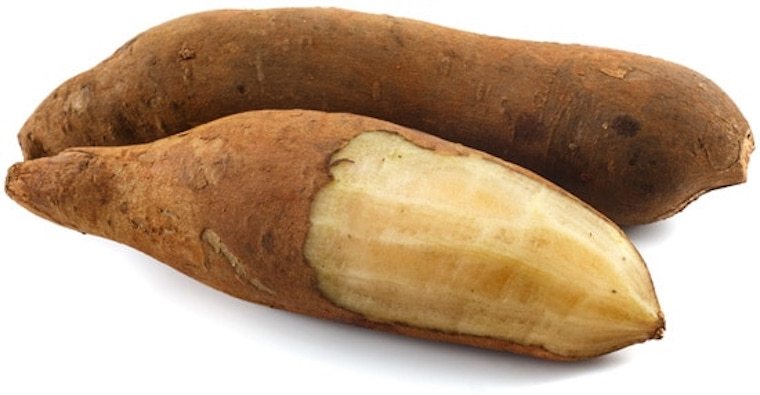
Photo: Authority Nutrition
I also wanted to touch on a fairly new trend which is the use of Yacon syrup as a low cal natural sweetener. Yacon syrup has recently become popular as a weight loss aid.
In the Andes mountains in South America, you’ll find Yacon syrup from the roots of the Yacon plant. The yacon plant is used for centuries as a medicinal tool. You might even mistake a Yacon root for a sweet potato. Through a very natural process, a tasty syrup resembling maple syrup, is extracted and filtered for use. Yacon syrup isn’t a zero-calorie sweetener, but it does contain one third of the caloric value of sugar.
How Did Yacon Syrup Become a Weight Loss Fad?
Well, you can thank America’s favourite doctor: Dr. Oz. Not surprisingly, all of the research supporting the weight loss benefits of Yacon syrup come from one single study. In the 2009 study women consuming Yacon syrup lost 33 pounds over a period of 120 days compared to the placebo group. This was a super short study with a small sample group. Also, there could have been a variety of factors that contributed to their weight loss (change in diet, increasing physical activity). Since 2009 there haven’t really been any new studies to support these findings.
This sweetener isn’t a weight loss aid in itself but does carry some key nutrients. Yacon syrup contains 40-50% fructooligosaccharides, which we cannot digest and pass through our digestive system. Fructooligosaccharides also contain inulin fibre which is a prebiotic that acts as a food source for the beneficial bacteria in our gut. So, if you want to get your prebiotic fix or cut back on sugar, sure go for it, but don’t rely on it as a reliable weight loss tool on its own.
Bottom line on monk sugar vs stevia vs yacon
Listen, I am all for natural foods. Meaning, I strongly advocate for eating food that is as minimally processed as possible. But to say that these low calorie natural sweeteners are a completely separate breed from artificial sweeteners is possibly not true. We still need a ton more research on most of them to catch up with the research we have on traditional artificial sweeteners. Ultimately, I think we should be focusing less on which sweetener to use and more on how much sweetener we’re using.
Become an Abbey’s Kitchen Subscriber
If you liked this post, you may like:
The Truth About Artificial Sweetener & Weight Gain
Aspartame & Artificial Sweeteners vs Sugar | Pros, Cons & Controversy
Should You Quit Sugar? Is Sugar Making You Sick?
Now I want to hear from you!
Have you heard of monk fruit syrup or Yacon syrup before?
Have you used Lakanto or stevia?
What’s your go-to sweetener of choice!
Comment below with your thoughts!
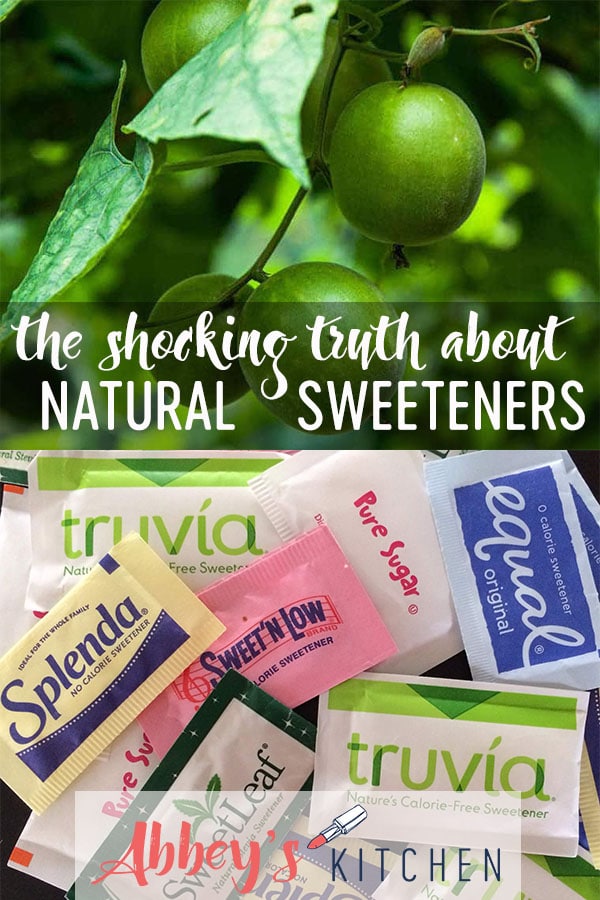
Contribution By:
Sofia Tsalamlal, MHSc, RD
Updated on December 2nd, 2021

Abbey Sharp is a Registered Dietitian (RD), regulated by the Ontario College of Dietitians. She is a mom, YouTuber, Blogger, award winning cookbook author, media coach specializing in food and nutrition influencers, and a frequent contributor to national publications like Healthline and on national broadcast TV shows.
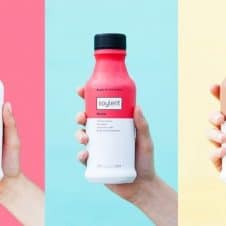
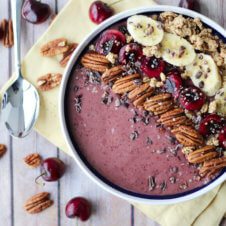
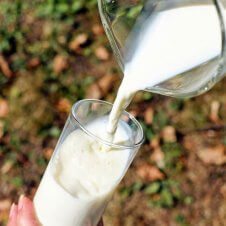

GiGi Eats says
I’ve been using Stevia for 17 years and Monk Fruit for at least 5. They both work really well with me and I am the type of person that believes to each their own when it comes to living – because everyone processes things differently!
Abbey Sharp says
Definitely! Thanks for sharing GiGi!
Else says
“What the F, #ByeFelicia!”, I stopped right there. It really didn’t matter what you said after that. Is it possible to have an intelligent conversation without dropping this bomb in every thought? I know millennials don’t consider such language as offensive, but maybe it would help to know where it comes from. With England’s crusade to mandate it’s subjects return to Catholicism, punishment for those who opposed and married in a Christian church were ascended upon by government troops. The troops would take the bride before the wedding and gang rape her in front of her husband; Fornication Under Consent of the King. Now you know. Doesn’t matter if you just use the one letter or the whole word. Certainly doesn’t belong on your blog, you think?
Abbey Sharp says
Hey! Thanks for your comment. It’s how I write my blogs, I’m sorry it offends you. Thanks for stopping by.
Andi says
Hi Abbey,
I love natural stevia leaves, but the store bought forms have a bad taste. I’ve got 2 kinds of Lo Han Gua (Monk Fruit). One is powder with slight citrus taste- not good w/everything. The other, looks and tastes like cane sugar, but has erythritol in it too. Just got it & so far, love it. Very sweet- a ‘serving” is a tsp- goes a long way. I haven’t tried Yacon, but will. I also tried Lucuma powder but it won’t mix in well with anything, and didn’t taste sweet. I can’t use aspartame (side effects), don’t like Splenda or processed Stevia, so when I’m out, I fall back on sweet & low. I know it’s fake, but I like it & it goes great with iced tea-unless it’s ‘generic’ which is mixed with other ‘nutritive’ sweeteners, like dextrose. Then it loses all appeal. Keep the info coming! Andi
Abbey Sharp says
Thanks for sharing Andi!
Sheila Gainous says
Hi I find that all of this is so confusing. First you told to use the artificial sweeteners rather than sugar. Then you’re told to use the natural sweeteners stevia agave monk fruit. Then you tell that all of them causes some kind of problems. Then you’re told oh this one is good for you. Is so confusing it’s driving me crazy!! I don’t know what to use anymore! I have been a fat girl all my life. I have been teased ridiculed, looked at as a glutton because of my weight. Which none of this is true I’m the hardest working person I know. I don’t eat that much never have! But I’m still fat. I’m looking for help and all I get is confusion!
Abbey Sharp says
So sorry to confuse you Sheila. The goal of the article was to explain the pros and cons of each because there really isn’t an easy answer. At the end of the day, my message was that there isn’t one particular sweetener that is better than the other, but really it’s about consuming these sugars in moderation.
Jennifer says
Dear Else, that is completely false. If you’re going to berate someone publicly, it would be best to have your facts straight first. Even a simple google search will show you a plethora of articles debunking the origin you listed.
Sam says
We should also consider that not everything that we consume is exactly as advertised. Take Lakanto as an example, it’s labeled “MONK FRUIT with Erythritol”. Reading the Nutrition Facts, it says “Serving size 8g”. Read a little further down, it says “Erythritol 8g”. But there’s no mention of Monk Fruit quantity anywhere, only that it contains Monk Fruit “extract”. Now, can anybody tell me how much “Monk Fruit” does this product contain, exactly?? MF is just a label that has been associated with health benefits and is used to attract buyers. Same with countless other diet, health, and miscellaneous products out there!
Tamara Proctor says
I’m a huge fan of monk fruit for baking. If I want to sweeten a drink I reach for stevia. I’ve been on KETO 10 months and have lost 61 lbs. It’s made a huge difference knowing I can have something sweet if I want it, however I rarely do anymore. Instead I just pin them knowing they are waiting for me.
Katya says
Hey, I’ve just started on KETO. Is your monk fruit sweetener pure or is it mixed with erythritol? I’m trying to work out whether it’s worth purchasing pure monk fruit powder?
Thanks
Cheryl says
Tamara Proctor, congratulations on living a healthier lifestyle! And of course the weight loss. I just want to impress upon the fact that the less you “give in” to cravings of sweet foods, the cravings decrease! The cravings for sweet foods never totally go away, but as you continue to choose healthier alternatives, the reward of better health is found! Whole foods, moderation and serving sizes helps in retaining weight loss and a healthy lifestyle! Congrats and best wishes in your healthy life!
Grace says
Monk fruit is my go to, stevia but overall I don’t really eat much.
Abbey Sharp says
Great!
Bonniek says
I am a type2 diabetic not using medication by choice. I have been using stevia, monk fruit and swerve for my beverages and baking. I have had UtIs periodically and some neuropathy in my feet. Today it dawned on me maybe I should check on any side affects of these products. Stevia seems like it could be the culprit for some of my issues. SOOOO, I’m going to stop using it a try least for awhile and see if my symptoms change. It seems to be the only thing I might be doing in excess. Anyone else experienced issues with any of these products?
Debbie says
I stopped using it too to see if it made my pain issue any better and it did not. But I don’t use much of any sweetener… I hope it or something helps you soon!
Ben says
Hey, Else! Millennials may use language you don’t like, but at least they don’t fall for silly folk etymologies like “Fornication Under Consent of the King.” The dreaded F-word predates Henry VIII, who famously broke with the Pope to found the Church of England. So the word was around when King and country were all Catholic. (The last Catholic king of England was James II, and he didn’t lead a crusade to return the country to Catholicism.)
It’s a good Anglo-Saxon word, which has cognates in other Germanic languages.
Ronalee Cochran says
Hi!
Right now I have monk fruit, date syrup, stevia, honey, and yacon syrup on my counter trying to decide which is best to add to my morning tea. Its so confusing! But like you I’m doing my research and want what is best for my health. I love that I ran into this article while I was researching. Very informative. I think as of right now for me, the yacon is the front runner.
Abbey Sharp says
That’s great, so glad.
Cheryl says
I am giving up in the stevia, as it is highly processed. Currently I have been using 1/2 tsp of dried monk fruit in my 16 ounce cup of hot green tea with matcha every morning. It seems to be the perfect sweetener for me! But I have to wonder about the processing of that also. In my investigations of sweeteners, the way a product is processed affects the way it affects the body! I have tried date syrup but don’t like the taste in my tea, even though I like dates. I’m considering trying the yacon syrup, as it seems to be in a more “natural” state as a syrup. I think it is sad how our government has misled us about “healthy” foods and sugar substitutes.
DC says
While I agree that sweeteners (artificial or natural) don’t aid in weight loss, it’s important to note that some sweeteners contribute more to weight ‘gain’ than others…specifically the ones that are high glycemic and impact insulin levels, so I’m a bit surprised this article/research didn’t delve into that. Speaking from personal experience, I’ve found that stevia helps me maintain my weight (no loss / no gain) whereas high-glycemic sweeteners (i.e. white sugar, cain sugar, HFCS, etc.) just make me want to eat more and thus gain more weight.
Abbey Sharp says
Hi there, we focused on artificial sweeteners and not natural sweeteners, but glad you found what works for you. Thanks for your comment!
Maralyn says
LOL, I would be able to watch my weight with Stevia too, with that nasty after taste, I would never eat anything sweet again.
Karen Kelvie says
Maralyn, I dislike many versions of stevia too. I dislike the liquid version of SweetLeaf. However, liquid stevia products made by NuNaturals and Trader Joe’s taste great to me. You might want to try these versions.
I’m switching away from stevia for my chocolate truffles because too many people have a bad association with stevia. You are not alone!
Janie says
There is a type of Stevia that
Is treated so that DOES NOT have the bitter aftertaste.
Good luck!
Audrey Gammie says
I have used both monk fruit drops or stevia …but the monkfruit drop seem to give me very bad gastrointestinal upset….the stevia doesnt. Maybe my monkfruit brand has sugar alcohols, but they arent listed on the label.
Mary White says
I get a nasty bitter after-taste with stevia…so just say no!
I’d like to make some pan-cookies whose recipe I found online, but what sweetener to use is the question. I’m not convinced that plunking down $$$ for monkfruit is a good decision.
Maybe I don’t really need sweets after all.
Lorena Manrique says
I live in Perú South America, and defintley Yacon has been used as a sweetener since ancien times… it is natural and has benefits for your health, it does not mean it will miraculously make you loose weight, but it is definitely much better than any other natural sweeteners and of course better than sugar or any ratificial sweetener.
Abbey Sharp says
Hey Lorena, thanks so much for sharing!
subin says
Hey Just because they (scientists) found Stevia to be bad to humans in someways it doesnt automatically mean MONK FRUIT is also bad thats a stupido mental fallacy and a biased unscientific judgement !
Monk fruit has been consumed in China since ages and nobody has complained anything against it. The active ingredient of Monk fruit is something called “Mogroside” https://en.wikipedia.org/wiki/Mogroside now they the scientists have found that Mogroside has many benefits other than a sweetining substance it was found to be having effective anticancer properties.
Whereas Stevias active ingredient is Rebaudioside A, or Reb A and Stevioside.
https://en.wikipedia.org/wiki/Rebaudioside_A
https://en.wikipedia.org/wiki/Stevioside
For your information there is a company engaged in the extraction of sweetning substance from OATS. website – http://oattech.com/ they call this product OATSWEET.
Now there is another product (sweetning substance) on the way its called Brazzein https://en.wikipedia.org/wiki/Brazzein which they the scientists have found it to be absolutely safe in humans.
Regards,
Subin
Abbey Sharp says
hi there, thanks so much for your information. Still not enough research for me, so will need to keep an eye out in the future! Thanks again 🙂
Ellen Watkins says
Yacon syrup and Monk Fruit both give me diarrhea. Would like to blend pure Stevia with pure Monk Fruit. Where can I find them?
Abbey Sharp says
Good question, i would try online!
Elizabeth says
I enjoyed your post on sweeteners Abbey. I agree we need to eat less of any sweetener. I usually use either cocoanut sugar or honey or maple syrup. On occasion I have used organic cane sugar. I try to find recipes with very little sweetener when I do want to bake something.
Abbey Sharp says
Totally, thanks Elizabeth 🙂
Natalie says
I love your posts Abbey. I really do. You always put so much info about everything. I haven’t know about monk fruit nor yacon syrup. Thanks for clearing that up. I totally agree with you.. We all should eat less added sugars in general 😉
Abbey Sharp says
Thanks so much Natalie 🙂
George Ann Highsmith says
Thank you for you for writing about monkfruit and stevia I use both I like monkfruit the best I grow stevia. Thank you for sharing. I wish they made drinks with monkfruit Thank you George Ann H.
Tracy says
Stevia gives me the worst headaches.. am trying monkfruit now. My vice is my morning cup of coffee. I am trying to get off of fake creamer (coffee mate) I don’t use much sugar otherwise. Have any of you used monk fruit in canning?
Esther says
Great article! I am not a fan of any of those sweeteners, artificial or ‘natural’. I actually get raging migraines when I accidentally have stevia in any form!
Thanks for sharing the truth!
Abbey Sharp says
Interesting! Thanks Esther 🙂
Linda says
Very interesting. I will look for it. I know Aspartame gives me the raging migraine. Thanks for sharing that bit.
Emily | EmPowered Nutrition says
Love this breakdown! So informative, Abbey!
Abbey Sharp says
thanks Emily!
Chrissy @ Snacking in Sneakers says
This is awesome! I love the focus on research here – even though some of them haven’t had much research yet. I’m totally with you that no matter what the sweetener, we should focus on keeping use to a reasonable level.
Abbey Sharp says
Yup! For sure! Thanks Chrissy
Jill Conyers says
Abbey the nutrition nerd in me loved reading this. I’ve wondered about the low calorie sweeteners. Honestly I rarely use sweetener at all because I never know what’s best. When I do it’s usually honey from a local farmer.
Abbey Sharp says
Haha I’m SO nerdy about this stuff too. Thanks Jill
Rachel says
I’ve been doing a little bit of research on this myself lately. Thankfully I don’t bake nearly as much as I used to and when I need something sweet I usually just go for a piece of fruit. But I think going forward when I do bake, I’ll just stick with honey and *gasp* sugar. I dunno. The verdict is still out on my part…
Abbey Sharp says
Yeah, still a lot of research needed in this area. Thanks for reading Rachel
Deborah @ Confessions of a mother runner says
I don’t like the taste of stevia or any of the artificial sweeteners so I try to stay away from them. Thanks for all the great info
Abbey Sharp says
Yup, thanks Deborah!
Alicia says
Hi everyone, awesome thread here. I know about all these sweeteners, but what I’m curious about is finding a low/no calorie sweetener to use in a simply syrup recipe. The trouble is finding one that doesn’t cause digestive issues, or causes the least amount of digestive issues, ie. Gas, bloating, diarrhea. Does anyone have any input? Thanks 🙂
Liz @ I Heart Vegetables says
I love this post, Abbey! I’m a big stevia fan so it was nice to learn more about it! Thanks for putting this together!
Abbey Sharp says
So glad! Thanks Liz 🙂
Patrick@looneyforfood.com says
This is so great! I tend to go for savory things just to avoid the whole issue of what is the lesser evil. I have learned to love back unsweetened coffee and use things like bananas, fruits and other fruits to make things sweet.
Abbey Sharp says
Awesome! I’m glad you found something that works for you 🙂